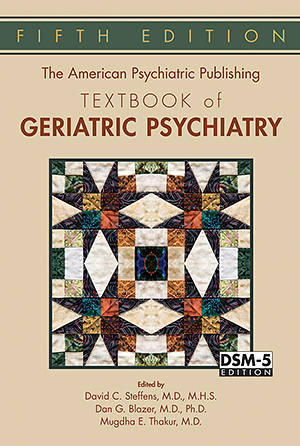Chapter 20.Psychopharmacology
Sections
Excerpt
Pharmacological intervention in late life requires special care. Older patients are more susceptible to drug-induced adverse events. Most concerning, several psychotropic medications have been associated during the past decade with serious adverse events, including increased mortality risk. Older persons are also more likely to experience adverse effects, including cardiac effects such as prolonged QTc, arrhythmias, and sudden death; peripheral and central anticholinergic effects such as constipation, urinary retention, delirium, and cognitive dysfunction; antihistaminergic effects such as sedation; and antiadrenergic effects such as postural hypotension that not only interfere with basic activities but also lead to falls and fractures. In addition, older patients might develop adverse effects such as hyponatremia, bleeding, and altered bone metabolism. Increased susceptibility to these various adverse effects in elders may be a result of the pharmacokinetic and pharmacodynamic changes associated with aging, such as diminished glomerular filtration, changes in the density and activity of target receptors, reduced liver size and hepatic blood flow, and decreased cardiac output (Pollock et al. 2009; Uchida et al. 2009) (Table 20–1).
Access content
To read the fulltext, please use one of the options below to sign in or purchase access.- Personal login
- Institutional Login
- Sign in via OpenAthens
- Register for access
-
Please login/register if you wish to pair your device and check access availability.
Not a subscriber?
PsychiatryOnline subscription options offer access to the DSM-5 library, books, journals, CME, and patient resources. This all-in-one virtual library provides psychiatrists and mental health professionals with key resources for diagnosis, treatment, research, and professional development.
Need more help? PsychiatryOnline Customer Service may be reached by emailing [email protected] or by calling 800-368-5777 (in the U.S.) or 703-907-7322 (outside the U.S.).



